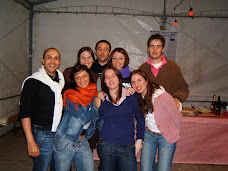This time we talked with Kelsey. Unfortunately during the weekend we didn’t have the possibility to skype at home as I had anticipated in my previous Skype post. This week we talked about coming election in America and Italy again. Our American peers created a wonderful and very accurate
wiki page about both Italian and American candidates with the basic points of their platforms, their strategies of communication, their key words, speeches and gestures and so on. We had a look to this wiki page and then we thought about the issues we would like to know more about.
These are the questions thought by our group with both the answers that Brian Albanese gave to Alessia and those that Kelsey gave to me and Alberto:
Group 2:
1. Compared to the two Italian political programs, don't you think that the American ones completely differ from each other?
Brian told us that our assumption was not groundless at all and that the party system in the Unites States is a bit too extreme. Nowadays, it has really become hard to choose between the two main parties and there are no intermediate positions available. Hilary's and Obama's political programs are of course much more similar to one another but if we go and read Mc Cain's, we will find out that his objectives are completely different (especially with reference to the issue of the war in Iraq). So, it is very difficult to feel truly represented by any of the two main parties because they're so extreme and the opinions that people in America have formed on certain issues may be completely different from the ones of the main candidates. He thinks that here in Italy maybe we can have much more choices given the amount of little parties and intermediate positions. (Alessia)
2. Do you think that the question of the troops on Iraq could affect your vote more than other issues such as 'health care' and environmental concerns?
Actually, the issue of the war in Iraq DOES play a fundamental role in the next political elections and of course the fact that Americans have to decide if they are against or in favor of the war is deemed to have an effect on their vote for one of the two parties; in other words, if you are against you are more likely to vote for Hilary or Obama, if you're in favor you would rather prefer Mc Cain (I've put it in a rather simple way but of course things may also be a bit more complicated). Anyway, Brian is keen to point out that environmental problems actually represent a very pressing issue too! Maybe, (to us) it was not clear enough, but many countries in America are nowadays really trying to take the right steps in order to solve the problem of global warming, to reduce gas emissions and to find alternative energy resources, which should be cleaner but also cheaper. (Alessia)
Kelsey said that the problem of American troops on Iraq is a fundamental point of this electoral campaign. People feel this issue as more important even of other issues such as health care or environmental proposals. Talking about the war on Iraq Alberto noticed how American soldiers are very young and if on one hand he was shocked of this fact, on the other for Kelsey this thing was quite normal and provoked no particular reactions.
3. Do you think that Clinton's and Obama's campaigns are more concerned with gender and race than mere political issues?
The possibility to have a Black leader or a woman as president is surely a great achievement for America. According to Brian, both of them can really give something more to politics because they can offer different perspectives on a large number of issues. Unfortunately, there has also been a lot of brainwashing from TV and that has contributed to turn the elections in a sort of gender or race struggle. Hence, many people still ask themselves whether these two candidates may have enough experience to rule the country, overlooking the great changes that their election can eventually cause. (Alessia)
Kelsey said that Clinton’s and Obama’s electoral campaigns are not concerned with gender and race. The only difference she noticed is that Obama is younger than Clinton and he could give a different and new image to the U.S.A..

 Hi everybody!
Hi everybody!
 Hi everybody!
Hi everybody!




 Our second Skype exchange was a funny and strange experience. This time I was supposed to talk alone with my American peer Kelsey. Unfortunately she wasn’t there and so I joined Alberto’s conversation. He was talking with Leah Barreras, a girl of Mexican origin. We talked about the years of lead in Italy. What she knew of our ‘70s came from some Italian movies she saw. However, she ignored who the Brigate Rosse are or what happened to Aldo Moro. Then we focused our conversation on international terrorism and the problem of immigration after September 11. According to what Leah said it seems that there’s no great difference in the approach of Americans towards immigrants after that terrorist attack. Mmm, I’m a bit sceptical about this point. Then we ran to Bush’s policy and the Iraqi war and finally we discussed about American and Italian coming elections.
Our second Skype exchange was a funny and strange experience. This time I was supposed to talk alone with my American peer Kelsey. Unfortunately she wasn’t there and so I joined Alberto’s conversation. He was talking with Leah Barreras, a girl of Mexican origin. We talked about the years of lead in Italy. What she knew of our ‘70s came from some Italian movies she saw. However, she ignored who the Brigate Rosse are or what happened to Aldo Moro. Then we focused our conversation on international terrorism and the problem of immigration after September 11. According to what Leah said it seems that there’s no great difference in the approach of Americans towards immigrants after that terrorist attack. Mmm, I’m a bit sceptical about this point. Then we ran to Bush’s policy and the Iraqi war and finally we discussed about American and Italian coming elections.





